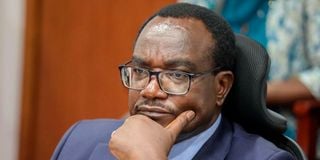
Education Cabinet Secretary Julius Migos Ogamba appearing before the Senate Committee on Education at Bunge Tower Nairobi on December 5, 2024.
The 129-member National Working Committee on the Review of the New University Education Funding Model has not submitted its final report despite its term having lapsed five weeks ago.
President William Ruto gazetted the committee on September 16 and tasked it with evaluating the controversial funding model following criticism that it had increased the cost of education and disadvantaged students from low-income backgrounds.
A member of the committee who is not authorised to speak to the press disclosed that the committee only managed to produce a draft report, citing significant challenges that impeded progress.
“We were given two months, but the time slipped by. The committee had asked for an extension because what we have is just a draft, which is supposed to have been submitted to the Cabinet Secretary for Education.
“You cannot blame the committee because its funding was inadequate — about Sh5,000 per day for transport, and some days had not been covered, meaning we have a deficit. We had to wait for a supplementary budget that delayed progress further,” the source revealed.
According to the source, the committee's operations were further hampered by poor communication and organisational disarray, leading to its failure to meet its objectives within the stipulated timeframe.
“The process was marred by disorganisation, unclear directives and a lack of transparency, hindering the committee’s work. We didn’t even know how much money we were supposed to get or how much money was allocated to the committee. We were just working blindly,” the insider added.
Calm tensions
The President announced the formation of the committee to calm tensions amid the threat of a nationwide students’ strike. There was public outcry after over 12,000 students appealed against their categorisation to determine the amount of money they would be awarded in the form of scholarships, student loans and bursaries.
According to a report presented to the Education Committee of the National Assembly, the education of 234,811 students admitted to universities in 2023 and 2024 is financed through the new funding model.
Universities Fund CEO Geoffrey Monari revealed that the process of appeals has also been halted and disgruntled students now have to stick to the bands they were placed in. On December 16, the High Court postponed making a judgment in challenging the model.
“The process has been halted as we wait for the court to give us a way forward. We are complying with the court order, and as long as the order is in place, implementation of the new funding model cannot go on, that includes disbursement of the funds,” said Mr Monari.
During a townhall meeting with university students, President Ruto noted that out of the 134,000 students who applied for the funding, 26,000 have appealed, stating they were placed in bands that do not reflect their financial situation.
“The committee was set up to look into the issue of students being placed in the wrong funding bands. However, the process has been halted for now,” Mr Monari said.
Expected outcomes
Education Cabinet Secretary Julius Migos Ogamba, while previously addressing the committee, acknowledged that the funding model had not yielded the expected outcomes. He emphasised the importance of being part of the solution, noting that several issues still needed to be discussed and resolved.
“The funding model that was introduced last year has not yielded the expected outcomes, and that is why we are here today. We decided to be part of the solution and not part of the problem. However, I am fully aware that several issues still need to be discussed and resolved,” he said.
Mr Ogamba stressed the need for genuine appeals to improve the system and that feedback should focus on addressing the needs of all students, not just the less fortunate. He also mentioned the need to address students placed in the wrong funding bands.
“We need to get genuine appeals that will make the system even better. I have not yet heard any appeal from students who were placed in the wrong band, such as being given Band One when they should be in Band Five,” he said.
Mr Ogamba called for urgent action to resolve pressing issues, including students who, by September 17, had already paid for housing but had lost an entire month of their academic year.
“We will work to ensure transparency, and we are committed to moving the task force to another location if necessary. Additionally, we are considering implementing a daily sustenance allowance for students,” he said.
Mr Ogamba also announced that the task force would be granted an extension to ensure that all concerns are addressed adequately.
“We will issue a letter extending the task force’s duration of work. This will ensure that we fully address the challenges that have arisen and come up with sustainable solutions,” he said.









